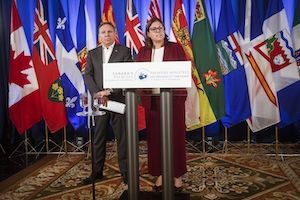Premiers urge Ottawa to advance infrastructure to boost economic growth
 Canada's premiers have ended their annual three-day conference in Winnipeg on Wednesday with a request that Ottawa do more to boost economic growth and trade.
Canada's premiers have ended their annual three-day conference in Winnipeg on Wednesday with a request that Ottawa do more to boost economic growth and trade.
Manitoba Premier Heather Stefanson, who hosted the meeting, said the premiers have asked for a dedicated meeting with the prime minister to discuss infrastructure priorities.
Stefanson said partnerships are needed to keep Canada competitive, but Ottawa must respect the unique jurisdictions of each province.
She said the provinces are united in their goal of advancing infrastructure in communities and between jurisdictions, including national economic trade corridors.
"That's going to be absolutely critical moving forward, making sure that we can get our goods to markets," she said.
The Atlantic provinces in particular raised concerns about incoming clean-fuel regulations, asking Ottawa to offset some of the costs to consumers. Other premiers urged dialogue with Ottawa over how costs of environmental regulations are passed down.
Ottawa has said those policies are to meant reduce emissions while enabling the country to seize economic opportunities.
"The problem with the federal approach is it's all stick and no carrot," said Alberta Premier Danielle Smith.
"They want the investment in green technology. And they want to encourage businesses to do that to create jobs and to grow. We can meet green energy standards, we can meet emissions targets, but we have to have growing economies."
She said Ottawa needs to build economic corridors, ports, rail lines and pipelines so that products can get to market.
Newfoundland and Labrador Premier Andrew Furey said this doesn't mean climate change takes a back seat.
"Certainly we all want to do our part," he said. "This is a question of fairness and all of us doing our equal part."
The premiers have also raised concerns about the bail system, asking Ottawa to reform the Criminal Code to prevent crime from repeat violent offenders.
They also say the federal government could help address staffing shortages in the health-care system by streamlining recruitment through immigration.
(C) The Canadian Press







